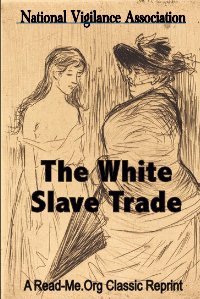By the National Vigilance Association.
Transactions of the International Congress on the White Slave Trade....held in London, 1899. The White Slave Trade is the traffic in girls for immoral purposes, which is unhappily carried on not only in the East, where slavery is avowed, but more or less throughout Europe, For such girls there is a constant demand in the markets of vice, on the part of the infamous persons who keep houses of ill-fame with resident inmates. In all such houses the position of the miserable women is one of servitude. Their isolation, their friendlessness, the contempt with which they are usually regarded by respectable society, keep them under the control of the keepers of the houses ; who by charging them extortionate prices for everything supplied, and retaining the ownership of even the clothes they wear, keep them always nominally in their debt, a debt which is recovered when they sell the girl to another house. For the girl is often procured and bought at great expense, and as she becomes less and less valuable for the corrupt purpose, she is sold to lower and lower houses. This trade is of course comparatively little known in England, owing to the publicity of proceedings, and the high rate of wages, though the societies which concern themselves with such matters are continually coming across cases of young girls decoyed, or persuaded away to foreign parts; and even in England it is not always easy, in practice, to get a girl out of a brothel. But the poorer parts of Europe are visited by travelling agents, who have their local purveyors, and conduct their victims to the East and West, where they are lost in the bad houses. One large branch of the trade goes through Constantinople, another has its destination in the South American ports, chiefly Buenos Ayrea.
London : Printed by Wertheimer, Lea and Co., 1899. 174p.








